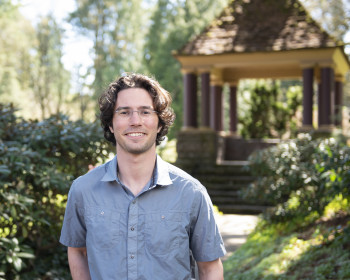Summer research students confront issues of cybersecurity
Open gallery

At Lewis & Clark, summer doesn’t necessarily mean vacation. Many students spend up to 40 hours a week doing collaborative research with faculty each summer.
Evan Damon ’13 and Julian Dale BA ’12 are working alongside Professor of Computer Science Jens Mache to investigate computer security and brainstorm new methods for teaching the subject to undergraduate students. In this Q&A, the researchers reflect on the value of these experiences.
What are you researching this summer?
Damon: We’ve been looking at “Denial of Service” attacks, firewalls, and mobile security (especially on iPhones and Android devices used by businesses that could contain or have access to sensitive information). The problem we’re looking to solve has to do with how undergraduate students might access these kinds of topics.
Dale: We are trying to build fun, interactive classroom assignments that will teach students security concepts and get them excited about the topic. We are currently developing a game that will teach students the concepts behind firewall administration. In this game, students will play through challenges that require them to protect their simulated network from certain kinds of traffic. Students playing in the same class will be able to track others’ progress through the game to make it fun and competitive.
How do you hope your experiences this summer will impact your future studies or professional pursuits?
Damon: Hopefully it will provide me with some experience relevant to international information security. I hope that the resources we develop will be useful to at least a few classes. Once I graduate, I would like to work in the security field.
Dale: This summer I’ll get to expand my applicable skill set. Building the firewall game will give me experience in imaging and designing a reusable product. Now that I’ve graduated, I’m starting a web application startup with some other Lewis & Clark graduates.
How do you think that student-faculty collaboration has impacted your education?
Dale: I have been Jens’ summer research assistant for two years now, and both summers have been the most educational experiences I’ve ever had. Research allows you to dedicate yourself to a particular problem and gain an understanding the classroom can’t provide.
Damon: Having faculty collaborate with us on projects helps a great deal. We’re able to do more as students when we collaborate with faculty.
About the program
The John S. Rogers Science Research Program allows students to participate in graduate-level research with an emphasis on strengthening their communication skills by requiring them to present their findings. This summer, 40 students are pursuing topics that range from cybersecurity to spider venom, and zebrafish to magnetic fields. Working closely with peers and faculty members, students undertake research questions and present their work in two public venues.
“We’re not asking you anymore, ‘What’s the answer,’ we’re saying ‘What’s the question,” said Michael Broide, director of the Rogers Program and chair of the physics department. “I think what sets our program apart is that regardless of what project you are on, we’re all going to come together as a group to present what we’re doing in as accessible a way as possible. In science, it’s such an important skill to be able to explain cogently what you’re doing.”
Students make their final research presentation at the Rogers Summer Science Poster session, held in conjunction with the Science Without Limits Symposium. Scheduled for September 18, the poster session is free and open to the public.
Zibby Pillote ’14 contributed to this story.
Opportunities in Science at Lewis & Clark
Read more about current research projects:
More Newsroom Stories
Public Relations is located in McAfee on the Undergraduate Campus.
MSC: 19
email public@lclark.edu
voice 503-768-7970
Public Relations
Lewis & Clark
615 S. Palatine Hill Road MSC 19
Portland OR 97219

